- Home
- Kathy Reichs
Bones of the Lost Page 13
Bones of the Lost Read online
Page 13
The ride was bumpy. The coffee was Turkish and tasted like tar.
Five hours after taking off, the pilot put down at Manas International Airport in Bishkek, Kyrgyzstan, the transit center for U.S. and coalition forces moving to and from Afghanistan.
As we taxied through blackness, I attempted some math. My watch said it was 9 P.M. EST. Monday. I estimated it was Tuesday morning in Kyrgyzstan. That’s all the precision my sleep-deprived neurons could muster.
A master sergeant named Grace Mensforth met me at the terminal. Medium build, brown hair, unremarkable features. The type witnesses rarely remember.
Mensforth introduced herself as my Air Force liaison. At my blank look, she explained that, though Kyrgyzstan operates the airport, the USAF runs the Transit Center. Thus her presence.
“How was your flight?”
“Uneventful.”
“Best we can hope for, eh?” She swept an arm left. “Baggage is this way.”
Mensforth led me across a cement-floored terminal that looked like the basement of a Stalinist factory. Boy-men in nine-foot peaked caps and long wool coats stood with automatic weapons slung across their chests.
My duffel was on the floor, a spot of tan in a sea of multicolored leather and speckled camouflage. I waded in and hoisted it free.
“Give me your passport.” Mensforth held out a hand. “I’ll handle the visa.”
“Thanks.”
“The red tape is unreal.”
Slowly, the baggage area emptied. I stood, cold seeping through my Nikes, jacket, and jeans, fatigue weighing on my body like a truckload of sludge.
Finally, Mensforth returned.
“This your first trip to the Islamic Republic of Afghanistan?” Handing back my passport.
“And Kyrgyzstan.”
“The Kyrgyz Republic. On to customs.”
Again Mensforth arm-motioned “this way.” I wondered if she’d been a maître d’ in another life.
Fortunately, the line was short. As we progressed, body length by body length, Mensforth took a stab at conversation.
“Kyrgyz comes from forty. Forty tribes.”
“Really.”
We lurched forward.
Mensforth interpreted my listless reply as either aloofness or lack of interest. From then on we waited in silence.
Fifteen minutes after queuing up, I was following my liaison across a pitch-black tarmac. The air was frosty, the wind damp and penetrating.
Head lowered, Mensforth angled to a white Air Force van and opened a side rear door. I climbed in. A kid in uniform loaded my bag, then slid behind the wheel.
As we drove, tiny lights shaped up in the distance. I spotted no other vehicles.
My head throbbed. My stomach churned. Sleep would definitely take precedence over food.
The trip to the air base was mercifully brief, maybe five minutes.
As the driver paused at a checkpoint to answer questions and present ID, including my passport and orders, I stared at the canvas-and-mesh-surfaced wall outside my window.
“That Hesco?” I was curious, despite my exhaustion.
“Yes, ma’am,” Mensforth said.
I’d read about Hesco. Made of crate-size units filled with sand and rock, then stacked three-high hard against each other, such barriers are strong but pliant. When ready to move on, base workers just empty the bags.
No idea why my brain dredged that up.
Finally, docs inspected and stamped, we cleared the gate.
The van wound past prefab rectangular structures, enormous Quonsets, what might have been a small mosque, a long, low arrangement that looked like a bar. Eventually, we pulled to the curb by a windowless, two-story number measuring about a hundred feet long by thirty feet wide.
“Female barracks.” Mensforth hopped out and cut toward a metal staircase on the building’s near end.
I followed. The kid trailed with my duffel on one shoulder.
We clanged up the stairs to a metal door. Mensforth gave me a key.
“You’re in 204. Take the empty rack.”
The kid dumped my bag and scuttled back down.
“You may luck out and have the room to yourself.” Mensforth spoke in hushed tones. “The head’s down the hall. I’ll collect you at oh-eight-hundred.”
Though the sky was still dark, I doubted dawn was far off.
“What time is it now?” I asked.
“Oh-four-thirty.”
Hallelujah.
The room, barely eight by ten, held two wardrobe units and two single beds. I lucked out. Both pillows were empty.
After opening my duffel, I fired to the head. Back in the room, I peeled off my clothes, pulled on a tee and clean panties, plugged in my iPhone, set the alarm, and collapsed.
Church bells bonged.
Startled, I opened my eyes.
My brain groped.
Manas.
I clawed the phone. Killed the bells. Checked the digits.
7:45.
Shivering, I yanked on BDUs and boots, grabbed my toiletry case, and trudged down the hall.
Quick swipe at the teeth and hair. Different brushes.
At 0800 I opened the outside door. The sun was a low white ball in an immaculate blue sky. Frost coated the grass like a dusting of sugar.
Mensforth stood at the base of the stairs, a puffy brown jacket draped over one arm.
“Good morning.” Breath coned from her mouth.
“Good morning. Bring my gear?”
“Yes, ma’am.”
I collected my duffel and backpack and clumped down the stairs.
“Take this.” Mensforth offered the jacket.
“You think it’ll be that cold?”
“Better to have and not need, than to need and not have.”
“My mother used to say that.”
“Mine too.”
We both smiled. I put on the jacket.
“Thanks.”
“Thank Uncle Sam. Hungry?”
“Oh, yeah.”
“Let’s hit a DFAC.” Pronounced dee-fack.
A different kid in uniform now manned the wheel of the van. Scarecrow thin, with buzz-cut hair.
As we drove, Mensforth briefed me on my upcoming travel arrangements.
“Your flight downrange is at noon, which means lockdown by oh-nine-hundred. You’ll be issued IBA at the airfield.”
Individual body armor. I was looking forward to that.
The kid made a couple of turns, then braked by a structure that looked like an aircraft hangar.
Mensforth and I presented ID and were admitted to the dining facility. After washing our hands at one of a score of taps, we entered the main hall. The air was thick with the smell of warming food. Sausage. Canned corn. Tortillas. Bacon.
Troops in camouflage and workers in civvies filled trays at hot and cold stations, salad and sandwich bars, burger grills, and dairy cases. Men and women of all ranks ate at hundreds of tables set out in rows.
Mensforth gave some instruction, which I missed, then left me on my own. I headed to a banquette that seemed to be drawing a decent crowd.
My instincts were good. Large metal bins offered standard Midwestern fare: eggs, bacon, toast, hash browns. I heaped my plate, added juice and coffee, then found an empty place at a table by a soft drink cooler.
Further down, on the opposite side, was a man in a uniform I didn’t recognize. French? Polish? Beside him sat a twentysomething carrying a weapon half her body weight.
Banging trays, clanging utensils, and humming conversation vied with football play-by-play coming from wall-mounted screens. Now and then staccato laughter broke through the din.
Mensforth found me, and we ate without talking. She’d gone for some sort of burrito with a cheeselike overlay. Breakfast finished, we bussed our trays and headed for the airfield.
Flight staging took place in another hangarlike affair with TVs airing yet more football.
Troops sat crammed onto benches, either on
cell phones or other devices or with eyes closed or numbly resting on a game. Observing them, I wondered, Is sport the new opiate of the masses?
Others slumped on duffels or slept tucked to the walls. Male or female, all looked weary. And wary.
Mensforth led me to a side room in which shelving and bins overflowed with IBA.
Personal protective gear is designed to protect your person. Which does not mean it fits your person. Especially if your person is of the doubleX gender.
Outer tactical vests come in four colors—woodland green camouflage, desert camouflage, universal camouflage, and coyote brown, the khaki of the Marine Corps. Mensforth handed me a universal, size small. I removed my outer jacket and slipped into the gray-green beauty. Not bad.
Then Mensforth added small-arms ballistic inserts to the front, back, and sides. And handed me a helmet. The combined weight came to somewhere north of forty pounds. I felt and looked like a Hesco unit with feet.
And then we waited.
I dozed on and off, mostly sat listlessly watching game after game.
Wisconsin lost by a field goal to Minnesota. Badgers and Gophers? Really?
Oklahoma hammered the TCU horned frogs.
Okay. Maybe small furry mammals didn’t make such bad totems.
The room grew thick with the smell of sweat, mildew, and dusty canvas. With the scent of exhaustion and fear.
At one point those around me began gathering their gear. Mensforth reappeared and told me to stay put. It wasn’t my flight. Mine was delayed.
Just past four, Mensforth finally led me onto a bus crammed with marines. Fifteen minutes later, we were standing on the tarmac outside a plane that looked as if it had been designed to transport shuttles for NASA.
“You’re going to be impressed.” The shriek of aircraft engines forced Mensforth to shout. “A C-130J can carry three vehicles, or close to a hundred troops.”
I eyed the plane’s interior, estimated the space was maybe forty by nine by ten.
Not exactly business class. I didn’t say it.
As I waited with what seemed like a thousand marines, crew offloaded cargo onto palletized rollers, then flipped down flooring.
“Word to the wise,” Mensforth said. “The heads on these babies aren’t designed for our team.”
“What’s the flight time to Bagram?”
“Two, maybe three hours.”
“I’m good.” I planned to sleep.
At a signal from a camouflage-clad kid with a rag around his head, Mensforth plucked me from the line and led me onto the plane. The marines watched in hostile, exhausted, or good-natured silence.
Seating was on long benches arranged in facing pairs. Back support came in the form of red nylon latticework strapping.
Parachutes and other gear hung from the fuselage walls. Pipes, tubing, cables, and countless things I didn’t recognize snaked overhead.
“Ass to the wall, you freeze,” Mensforth said. “Ass to the center, you go numb.”
Numb sounded good.
“You can lose the body armor.”
Grateful to offload the extra poundage, I removed the hated jacket. Mensforth tossed it to the floor at the end of the bench, then showed me how to stow my helmet at my feet and my pack in my lap.
“Use ’em.” Offering a small packet containing two orange earplugs.
I nodded.
“You’ll be met at Bagram by a Captain Welsted.”
I thanked Mensforth, wondered briefly if she knew the purpose of my trip. Then she said an odd thing.
“Watch your back.”
“Got my trusty IBA.” Tapping my helmet.
“That’ll handle the bullets.” Glancing left then right, she leaned close. “Be careful.”
Before I could ask her meaning she said, “Have a good one.”
Then she was gone.
The plane filled fast. A marine the size of a linebacker took the “seat” to my left. A black kid with spectacularly white teeth dropped down on my right. Opposite, I drew a guy who had to be seven feet tall. My knees met his lower legs at about mid-tibia. Snugly.
After a final round of shouting, the crew shut the hatch. I glanced at my fellow passengers. Most were male and in their twenties.
I heard a lot of “fucking” this and “fucking” that. Bravado. We were going downrange. In Pete’s day the phrase had been “in country.” Same idea. Same apprehension. We were heading to war.
I noticed a man three over and opposite, watching me intently. Asian. Maybe eighteen.
I smiled. The man looked away.
The engines thundered to life. I inserted the earplugs.
The ungainly craft lumbered skyward. Finally leveled.
I lowered my lids. Tried to sleep.
We pitched and dipped, engines throbbing out a deafening roar. Icy air blew up my back. Though shoulder to shoulder, shin to shin with my seatmates, a penetrating cold invaded my bones. Before long I felt desperate to stretch, or at least reposition. Knew there wasn’t a chance.
Time passed. My brain lingered on that border between waking and sleeping.
Suddenly my body lurched at an angle that had to be wrong. Beside me, the linebacker tensed.
Adrenaline shot through me.
My eyes flew open.
The plane was dark as a tomb.
And plunging toward earth.
ALL AROUND ME was black.
My left side was smashed against the linebacker. The kid with the teeth was smashed against me. Knowing it was pointless to fight gravity, I made no attempt to right myself.
Then the whine of the engines dropped. Our three-person sandwich unzipped slightly.
The wheels hit hard. Hit again, with less force. Again.
My heartbeat settled. We were rolling on terra firma.
After a short taxi, the plane jerked to a stop. The lights came on, the hatch opened, and outside air filtered into the fuselage, bringing with it the smell of fuel and exhaust.
We waited as pallets of cargo were unloaded, and then, row by row, collected our gear, moved rearward, and hopped onto the tarmac. My eyes swept a three-sixty arc, anxious for a sense of the strange land I’d heard so much about.
Overhead, a universe of stars winked in a boundless black dome. On the ground, nothing but darkness.
We all waited for the luggage pallets to be opened. Collected our gear. Then, unsure what to do, I followed the marines toward a square black shape on the horizon.
As we drew close, the shape crystallized into a one-story building. Standing at its door were a man and a woman, the former in civvies, the latter in camouflage fatigues and eight-pointed utility cover.
The woman was about my age, tall and solid but attractive in a no-nonsense, no makeup way. Her dark hair was knotted at the back of her cap.
Like Katy’s.
No way. Focus.
The woman took the lead. “Dr. Brennan?”
I nodded, thinking the question pointless. How many fortysomething civilian females arrived at Bagram by military transport?
When the woman extended a hand, double bars were momentarily illuminated on her fatigues.
“Maida Welsted, base ops.”
“Captain.”
We shook.
The man shifted his feet. Signaling impatience? Annoyance? Welsted ignored him.
“I’ll be handling field ops for the exhumation in Sheyn Bagh. All mission assets—team, vehicles, armaments, air transport.” Welsted’s English was softly accented. British? Anglo-Indian? Spanish? “You need anything, you go through me.”
“Dr. Brennan has had a long flight.”
The man was tall, maybe midthirties. A blue athletic cap covered what I suspected was a hairline heading south.
Welsted looked at the man. In the dim light escaping the door, I couldn’t read her expression. But the man seemed to stiffen.
“I’m just saying, we can do this in the morning. She’s been on a plane for four hours. Probably wants dinner and rack time
.”
The man’s hand shot my way. “Scott Blanton, Naval Criminal Investigative Service.”
Blanton’s grip was firm, but no match for Welsted’s.
Without a word, Welsted turned and crossed to a pair of men standing outside the depot at our backs. The younger wore jeans and a windbreaker with a White Sox logo. The older was in baggy linen pants, knee-length shirt, and voluminous sweater. Both had beards and unkept hair.
“Captain Welsted can be a bit stiff.” Blanton smiled, revealing one upper incisor overlapping the other. “Texan, you know.”
Not sure how to respond, I said nothing.
Behind Blanton, the men listened to Welsted, both overnodding. In less than a minute, she rejoined us.
“Let’s get you to your B-hut.” Without waiting for a reply, Welsted strode off.
Blanton shrugged, and, despite my repeated protests, took my duffel.
We boarded a van whose driver was indistinguishable from the pair at Manas. A short ride and a long security check brought us onto a base that, in the dark, appeared similar to the one I’d just left in Kyrgyzstan.
With one big difference.
Here I would enjoy no dorm-room comfort. No toilette down the hall.
My quarters consisted of one half of a B-hut, a plywood box in a maze of identical boxes, all squatting in a field of kiwi-size gravel. The interior, maybe eight by ten, contained two bunks, two slapped-together nightstands, a wooden wardrobe filled with shrink-wrapped cases of bottled water, and a table heaped with dusty magazines and ancient copies of Stars and Stripes. And, miraculously, a PC terminal that looked twenty years old.
That was the good news. The bad news?
The bath facility was an ankle-twisting football field away.
After informing me that we’d have a briefing with the head of base ops at 0900, Welsted took her leave.
“You want to get some chow?” Blanton asked.
Though exhausted, I’d had nothing but granola bars and Diet Coke since breakfast.
“Sure.”
I dumped my gear. As we walked, I told Blanton about Katy. He said he’d look into tracking her down.
A quick burger and chips and I was back at the B-hut.
“Breakfast at oh-eight-hundred?”
“I can find my way.”
“Things look different in the light.”

 Two Nights
Two Nights The Bone Collection: Four Novellas
The Bone Collection: Four Novellas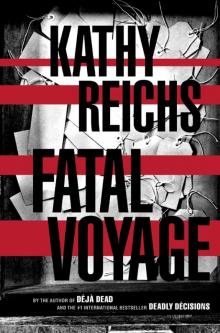 Fatal Voyage
Fatal Voyage 206 Bones
206 Bones Bones to Ashes
Bones to Ashes Terminal
Terminal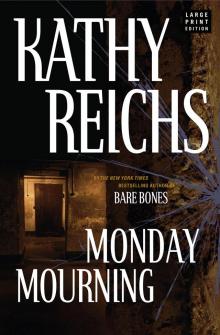 Monday Mourning
Monday Mourning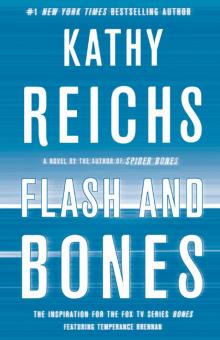 Flash and Bones
Flash and Bones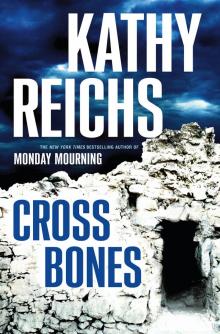 Cross Bones
Cross Bones Devil Bones
Devil Bones Break No Bones
Break No Bones Swamp Bones
Swamp Bones Déjà Dead
Déjà Dead Shock
Shock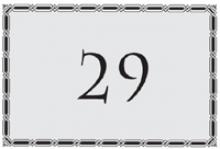 Spider Bones
Spider Bones Death Du Jour
Death Du Jour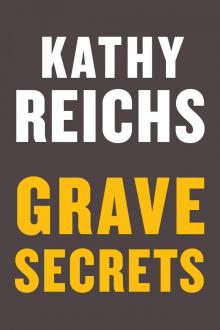 Grave Secrets
Grave Secrets Trace Evidence: A Virals Short Story Collection
Trace Evidence: A Virals Short Story Collection Bones on Ice
Bones on Ice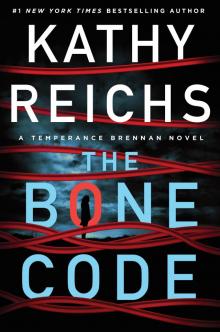 The Bone Code
The Bone Code Bones in Her Pocket
Bones in Her Pocket Seizure:
Seizure: Speaking in Bones
Speaking in Bones Deadly Decisions
Deadly Decisions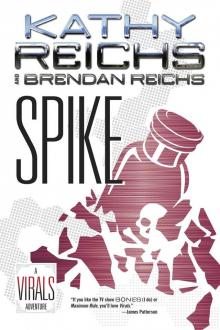 Spike
Spike Bones Never Lie
Bones Never Lie Bones of the Lost
Bones of the Lost Virals 03.5 - Swipe
Virals 03.5 - Swipe Exposure
Exposure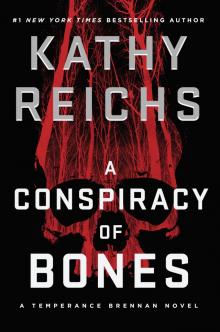 A Conspiracy of Bones
A Conspiracy of Bones Shift (tory brennan)
Shift (tory brennan) Bones of the Lost: A Temperance Brennan Novel tb-16
Bones of the Lost: A Temperance Brennan Novel tb-16 Virals tb-1
Virals tb-1 Bones Are Forever tb-15
Bones Are Forever tb-15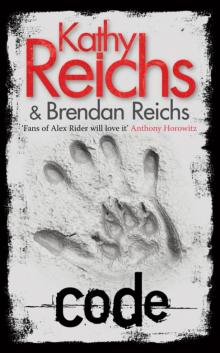 Code tb-3
Code tb-3 Seizure tb-2
Seizure tb-2 Deadly Descisions
Deadly Descisions Spider Bones: A Novel
Spider Bones: A Novel